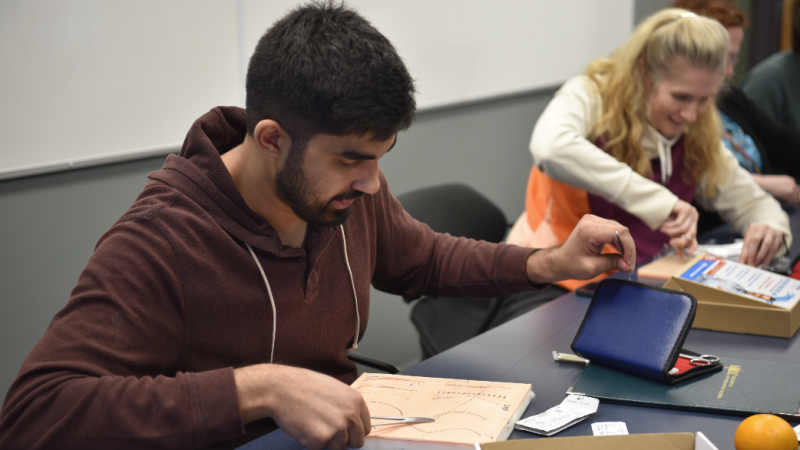UNBC Family Nurse Practitioner program doubles available seats
With support from the Province of British Columbia, the Master of Science in Nursing: Family Nurse Practitioner (FNP) Program at UNBC has expanded, doubling in size from 20 to 40 seats.

The Family Nurse Practitioner master’s degree program at the UNBC School of Nursing has doubled the number of seats available, expanding from 20 to 40 seats, thanks to support from the Province of British Columbia. The increase provides more opportunities for nurses interested in pursuing advanced education in northern B.C., an area rich with opportunity for health-care professionals.
The expansion in the UNBC Master of Science in Nursing: Family Nurse Practitioner (FNP) Program is part of B.C.’s Health Human Resources Strategy, announced in September 2022, which builds on previous investments in nurse practitioner training capacity to increase the number of seats from 45 in 2017 to 120 seats around B.C., including the new expansion at UNBC.
“Filling in-demand jobs and providing much needed health care services for people in British Columbia is a priority for our Government,“ said Selina Robinson, Minister of Post-Secondary Education and Future Skills. “This funding allows UNBC to train more nurse practitioners and will help improve access to primary and acute care services, particularly in Northern B.C.”
Family nurse practitioners are advanced practice nurses who have completed a clinically-focused master’s education. They provide patient- and family-centred care to all ages of people in primary health care, acute care, residential care or specialty settings. They are autonomous health-care professionals with a regulated scope of practice that includes diagnosing and managing illness and chronic conditions through ordering and interpreting lab or diagnostic tests; prescribing medication and other treatments; referring to specialists; and ensuring comprehensive care that includes health promotion and illness prevention. They can carry their own patient panels and provide comprehensive primary care services as a patient’s Most Responsible Provider.
“The doubling of nurse practitioner seats at UNBC is part of our government’s plan to expand primary care capacity in the province,” said Adrian Dix, Minister of Health. “We are also creating long-term career opportunities that are incredibly rewarding with job flexibility in communities around B.C. that will go a long way to ensure people are cared for by well-trained professionals. Along with adding seats, we continue to make progress in all areas of B.C.’s Health Human Resources Strategy to recruit, train and retain health-care workers while redesigning the health-care system to foster workplace satisfaction and innovation.”
The UNBC FNP program is a primarily online program that is completed over the course of two years (full-time, or three years part-time). Students complete 752 hours of clinical practicum hours and attend several weeks of in-person skills development courses at UNBC’s Prince George campus during their studies.
“We are focused on educating nurses to be FNP leaders in the delivery of primary health care in northern, rural and Indigenous communities,” says Dr. Rebecca Schiff, Dean of UNBC’s Faculty of Human and Health Sciences. “This seat expansion provides us with a tremendous opportunity to enable more nurses to pursue their career goals and access high quality education while continuing to provide exemplary care in support of sustainable community development across northern B.C.”
UNBC’s School of Nursing made its debut earlier this month on the best nursing schools in Canada list in the latest Maclean’s magazine university rankings. Based on a survey of faculty and senior university administrators, UNBC’s nursing program was ranked 16th overall out of the 72 nursing schools in Canada.
"The FNP degree at UNBC equipped me with the unique knowledge and skills I needed to provide care to remote populations and deepened my understanding of rural health services in the North," said Lizzie Czechmeister, a graduate of the UNBC Family Nurse Practitioner master’s degree program. "I'm excited to remain in northern B.C. and begin my career as a family nurse practitioner in Smithers."
“Our family nurse practitioner graduates are helping to make a difference every day in their region of practice and in the lives of northern and rural patients,” said UNBC President Dr. Geoff Payne. “UNBC will continue to collaborate with our many regional partners to empower healthy, productive and thriving communities as we work together to address critical health needs in northern B.C. and beyond.”
Applications for the MScN Family Nurse Practitioner program are currently being accepted for the expanded cohort in September 2024. The deadline for submissions is Nov. 15, with receipt of references and outstanding application items by Dec. 1 to be eligible for admission.
